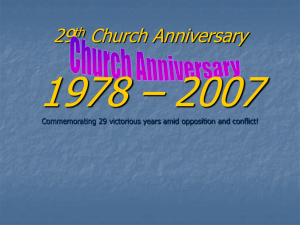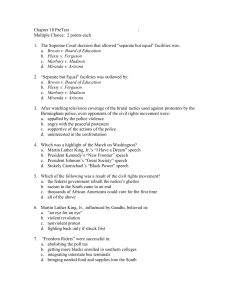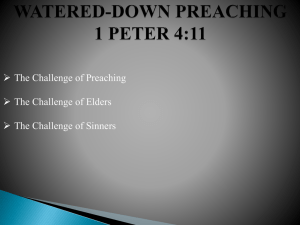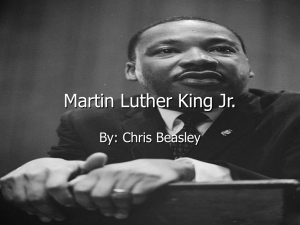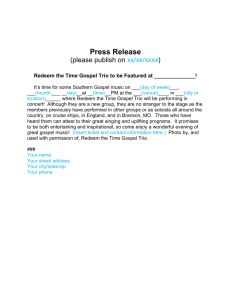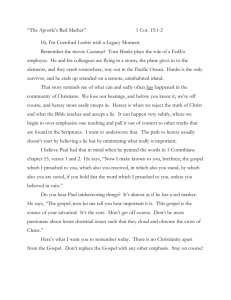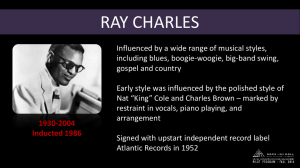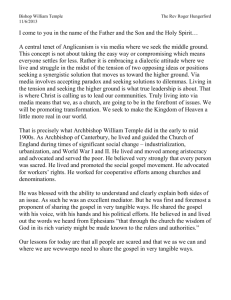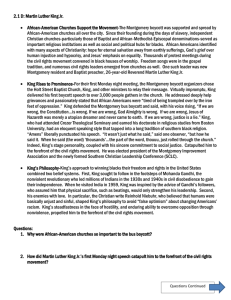Martin Luther King Jr. Notes
advertisement
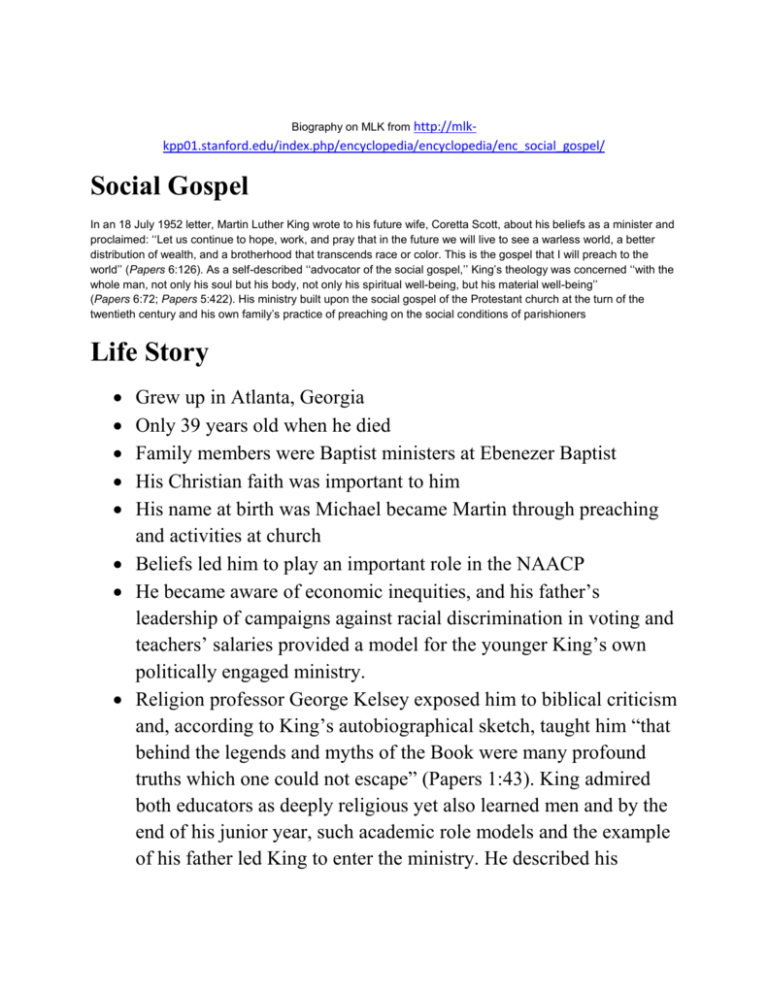
Biography on MLK from http://mlkkpp01.stanford.edu/index.php/encyclopedia/encyclopedia/enc_social_gospel/ Social Gospel In an 18 July 1952 letter, Martin Luther King wrote to his future wife, Coretta Scott, about his beliefs as a minister and proclaimed: ‘‘Let us continue to hope, work, and pray that in the future we will live to see a warless world, a better distribution of wealth, and a brotherhood that transcends race or color. This is the gospel that I will preach to the world’’ (Papers 6:126). As a self-described ‘‘advocator of the social gospel,’’ King’s theology was concerned ‘‘with the whole man, not only his soul but his body, not only his spiritual well-being, but his material well-being’’ (Papers 6:72; Papers 5:422). His ministry built upon the social gospel of the Protestant church at the turn of the twentieth century and his own family’s practice of preaching on the social conditions of parishioners Life Story Grew up in Atlanta, Georgia Only 39 years old when he died Family members were Baptist ministers at Ebenezer Baptist His Christian faith was important to him His name at birth was Michael became Martin through preaching and activities at church Beliefs led him to play an important role in the NAACP He became aware of economic inequities, and his father’s leadership of campaigns against racial discrimination in voting and teachers’ salaries provided a model for the younger King’s own politically engaged ministry. Religion professor George Kelsey exposed him to biblical criticism and, according to King’s autobiographical sketch, taught him “that behind the legends and myths of the Book were many profound truths which one could not escape” (Papers 1:43). King admired both educators as deeply religious yet also learned men and by the end of his junior year, such academic role models and the example of his father led King to enter the ministry. He described his decision as a response to an “inner urge” calling him to “serve humanity” (Papers 1:363) Although he considered pursuing an academic career, King decided in 1954 to accept an offer to become the pastor of Dexter Avenue Baptist Church in Montgomery, Alabama. In December 1955, when Montgomery black leaders, such as Jo Ann Robinson, E. D. Nixon, and Ralph Abernathy formed the Montgomery Improvement Association (MIA) to protest the arrest of NAACP official Rosa Parks for refusing to give up her bus seat to a white man, they selected King to head the new group. In his role as the primary spokesman of the year-long Montgomery bus boycott, King used the leadership abilities he had gained from his religious background and academic training to forge a distinctive protest strategy that involved the mobilization of black churches and skillful appeals for white support. With the encouragement of other pacifists, King also became a firm advocate of Mohandas Gandhi’s precepts of nonviolence, which he combined with Christian social gospel ideas. After the United States Supreme Court outlawed Alabama bus segregation laws in Browder v. Gayle in late 1956, King sought to expand the nonviolent civil rights movement throughout the South. King’s speech at the 28 August 1963 March on Washington for Jobs and Freedom attended by more than 200,000 people, was the culmination of a wave of civil rights protest activity that extended even to northern cities. In his prepared remarks King announced that African Americans wished to cash the “promissory note” talked about with language of equality in the Constitution and the Declaration of Independence. Closing his address with unrehearsed remarks, he insisted that he had not lost hope: “I say to you today, my friends, so even though we face the difficulties of today and tomorrow, I still have a dream. It is a dream deeply rooted in the American dream . . . that one day this nation will rise up and live out the true meaning of its creed:‘we hold these truths to be selfevident, that all men are created equal.’” He appropriated the familiar words of “My Country ‘Tis of Thee” before concluding, “when we allow freedom ring, when we let it ring from every village and every hamlet, from every state and every city, we will be able to speed up that day when all of God’s children, black men and white men, Jews and Gentiles, Protestants and Catholics, will be able to join hands and sing in the words of the old Negro spiritual, ‘Free at last, free at last, thank God Almighty, we are free at last’” (King, Call, 82, 85, 87) King’s ability to focus national attention on orchestrated confrontations with racist authorities, combined with his oration at the 1963 March on Washington, made him the most influential African-American spokesperson of the first half of the 1960s. As the African-American struggle expanded from desegregation protests to mass movements seeking economic and political gains in the North as well as the South, King’s active involvement was limited to a few highly publicized civil rights campaigns, such as Birmingham and St. Augustine, which secured popular support for the passage of national civil rights legislation, particularly the Civil Rights Act of 1964. Until his death King remained faithful in his commitment to the radical transformation of American society through nonviolent activism. In his essay that was published after he died, “A Testament of Hope” (1969), he urged African Americans to refrain from violence but also warned, “White America must recognize that justice for black people cannot be achieved without radical changes in the structure of our society.” The “black revolution” was more than a civil rights movement, he insisted. “It is forcing America to face all its interrelated flaws-racism, poverty, militarism and materialism” (King, “Testament,” 194).
